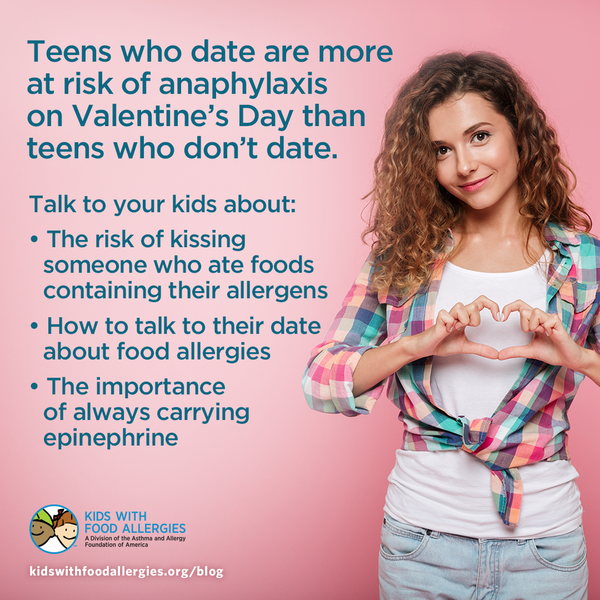Valentine's Day has long been associated with kisses, candy, parties and special treats. For children with food allergies, this can mean being left out or feeling unsafe. With some advanced planning, you can keep your sweethearts with food allergies safe and included.
Use open communication with your child and their caregivers to reduce the chances of a food allergy reaction. Whether toddler, teen or somewhere in between, make a plan to keep your loved ones safe this Valentine's Day:
1. At School: Communicate With Your Child and Their Teacher in Advance
Ask your child's teacher if students will be exchanging Valentine's Day cards. If so, ask the teacher to encourage classmates to only include non-food treats.
Make a plan with your child and the teacher for how to manage Valentines that have may have unsafe treats attached. Some options include:
- Provide the teacher with safe alternatives (stickers, pencils, allergen-free candy) to put in your child's Valentine's Day card collection.
- Volunteer to help in the classroom that day so you can check the cards and candy yourself.
- Make an agreement with your child that they will not open candies or cards until you can check them together to see what is safe. Have some fun things to swap for anything that is not safe to eat.
2. Label Reading: Review How to Read Labels for Food Allergens
On Valentine's Day, your child may be offered candy or other treats. Make sure your child knows not to open or eat any treats unless someone reads the ingredient label to make sure it is safe. For younger children, make sure they know which trusted adults they can ask – this could be a parent, trained teacher or another caregiver. For older children who can read labels, review the rules.
Valentine's Day candies may look similar but can be different from the regular version of the same candy. This means labels must be checked carefully. Share these reminders about candy label reading:
- Different sizes of candies may have different ingredients or advisory labels.
- Seasonal candies may be processed in different facilities than regular versions.
- Individual candies that were packaged in bulk may have different label information or may not have ingredients labeled.
- Candies labeled "allergy-free" or "school safe" may still contain your child's allergen.
- If you cannot verify the ingredients, or if the candy is unwrapped, it's not safe for your child to eat.
3. Teens and Kissing: Talk With Your Teen Before Valentine's Day
For people with food allergies, sometimes a kiss is more than just a kiss – it's exposure to what they are allergic to. Saliva contains food protein after we eat which increases the risk of an allergic reaction from kissing or sharing forks and spoons, even if partners have brushed their teeth or chewed gum.
One survey that asked what parents discuss with their children with food allergies about dating and kissing found that less than half of parents talk with their children about the risks of kissing someone who ate food containing their allergens. Also, less than half of the parents coach their teens to tell their dates about their food allergies. About one-third of parents surveyed do not remind their teen to take epinephrine with them on dates. The survey found that teens who date are more at risk of anaphylaxis on Valentine's Day than teens who don't date.

If you find it hard to talk to your teen about these subjects, you are not alone! You know your child best and it's up to you to:
- Empower your child to be their best advocate.
- Review your child's anaphylaxis action plan with specific emphasis on how to avoid allergens and to always carry epinephrine.
- Communicate that it is important to administer epinephrine quickly.
- Encourage your child to talk to their date about food allergies. Your child may feel embarrassed and try to downplay symptoms or may not be thinking clearly during a reaction. Someone having an allergic reaction should not go to the bathroom or elsewhere alone. Others around need to support your child for prompt treatment.


Comments (1)